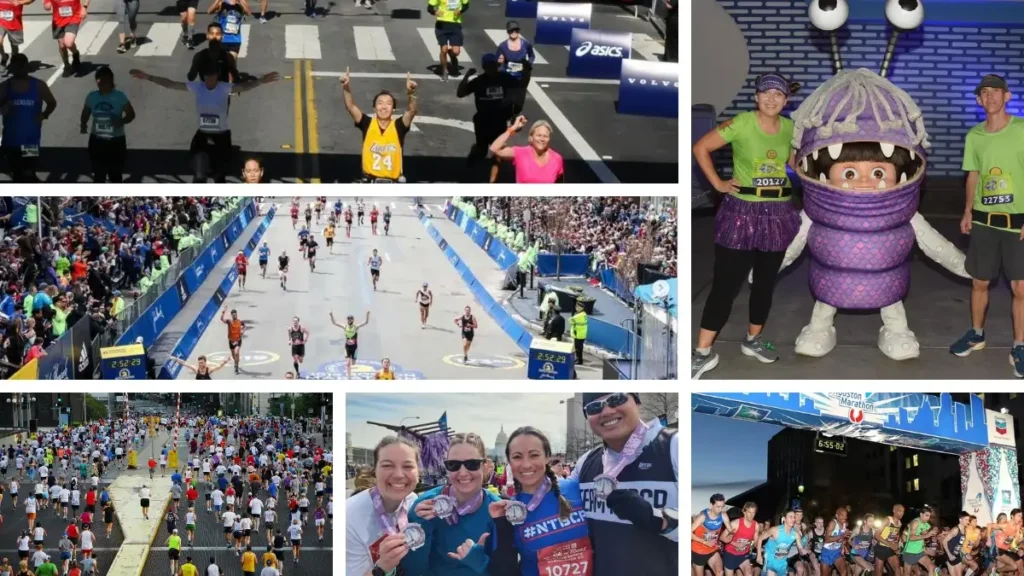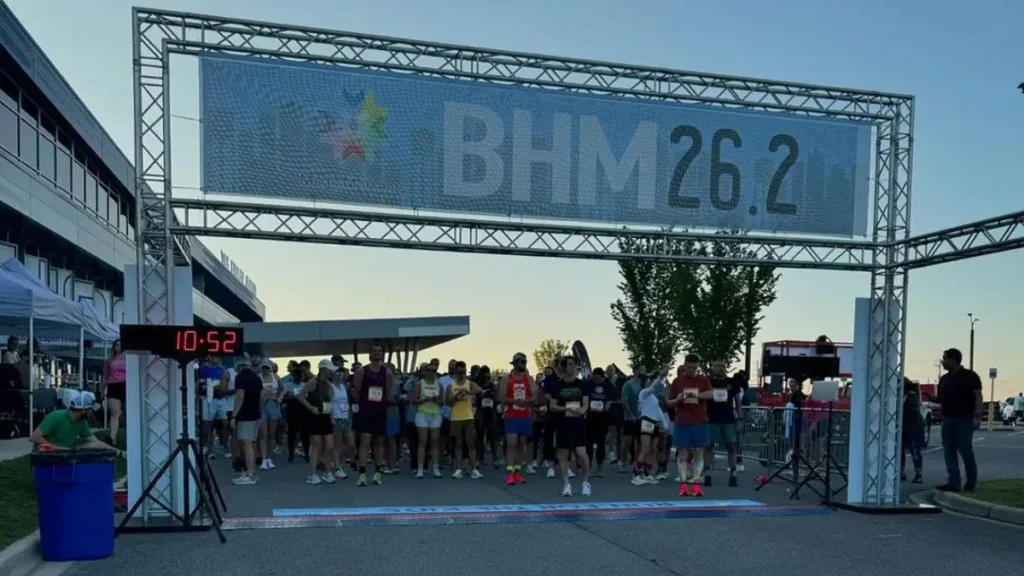Marathons in Texas don’t all follow the same playbook.
From gritty cobblestones to flat fast roads, each one delivers a different kind of test.
I’ve reviewed the big names like the Cowtown Marathon, and included some hidden gems later on!
Get yourself read up on what to expect on race day, so there are no nasty surprises!
Check out my Top 50 Best Marathons in the US, or choose another state:
The Cowtown Marathon
Fort Worth | Mar 1, 2026


Course Type: Rolling Hills
Elevation Gain: 736 feet (224m)
Participants: 1,750 Finishers (2025)
Price: $115-$195
The Cowtown doesn’t run like the other big Texas marathons. Houston is flat and fast, Dallas leans on history, Austin gives you hills through the capital. Fort Worth’s race mixes all of that together, then adds its own quirks. The course climbs about 736 feet, spread across steady rollers that test your pacing, especially in the second half. It’s mostly concrete, which wears on the legs, but the Stockyards section throws in old cobblestones that no other Texas marathon has.
The scenery feels different, too. One moment it’s the quiet of the Trinity River, the next it’s the Cultural District lined with museums, and before long you’re weaving past longhorn statues where the city’s cowboy past still lingers. It has a way of shifting moods mile by mile, which keeps the race from feeling predictable.
Aid stations are frequent, about every mile and a half, and the crowds are genuinely loud, not just scattered applause. There’s music, cowbells, and a sense that Fort Worth takes pride in the effort you’re putting in.
The marathon is only one piece of a weekend that includes a 5K, 10K, half, full, and even an ultra. The kids’ races tied to the C.A.L.F. program, which provides shoes to thousands of local students, give the event a community backbone that others don’t always have. By the time the weekend ends, it feels less like a single race and more like a city-wide running festival.
It’s not the easiest course in Texas, and it’s not the flattest. But it has character written into the pavement.
Dallas Marathon
Dallas | Dec 14, 2025


Course Type: Rolling Hills
Elevation Gain: 843 feet (257m)
Participants: 3,405 Finishers (2025)
Price: $149-$169
The Dallas Marathon has been around since 1971, which makes it the oldest marathon in Texas. Race weekend takes over downtown in December, with the marathon and half starting and finishing at City Hall Plaza. The route heads out past Deep Ellum and Uptown, swings around White Rock Lake, and then makes its way back through the city.
It isn’t flat. The course picks up around 800 feet of climbing, mostly in gentle rollers, though the return from the lake back into downtown can feel like a long grind. If the wind’s blowing across the lake, the middle miles get even tougher.
Crowd support is solid and sometimes loud. Greenville Avenue is a standout stretch, with bands, yard parties, and locals who treat the race like a block festival. Aid stations show up often (about 20 in total) with water, sports drink, and a couple stocked with gels when you need them most.
What makes Dallas different is the scale of the whole thing. It’s not just the marathon. The weekend packs in shorter races, a Friday night mile, even a 50K. It’s a Boston qualifier, so you get plenty of fast runners, but it’s also tied closely to Scottish Rite for Children, which gives it a strong community feel.
It doesn’t have the single defining quirk of some Texas races, but Dallas is steady, big, and reliable. City energy, the lake loop, a little bit of climbing, and a lot of history, that’s the mix here.
Houston Marathon
Houston | Jan 11, 2026
Course Type: Very Flat
Elevation Gain: 225 feet (68m)
Participants: 7,917 Finishers (2025)
Price: $150-$210
The Houston Marathon is built for speed. The course starts downtown and winds past Hermann Park, Rice University, and The Galleria before circling through Memorial Park and heading back along Allen Parkway. There are no real hills to worry about, just 225 feet of climbing total, so you can set and forget with your pacing.
Weather is the wildcard. Being mid-January, race day might bring cool, ideal running conditions, or it might swing humid enough to slow things down. Either way, the asphalt-heavy course keeps things fast compared to the rolling profiles in Austin or Dallas.
One detail that makes Houston stand out is the strict cut-off at mile 7.6. If you’re not on marathon pace by then, you get redirected to the half. It keeps the field moving smoothly but adds pressure to settle in early. Aid stations are reliable, popping up every mile and a half, stocked with Gatorade Endurance, water, and Clif gels at miles 19 and 22.
The crowd support has its own flavor. Neighborhoods set up “Hoopla” stations with live bands, cheer squads, and even costumed groups like the infamous belly dancers at West University. Memorial Park brings a different kind of energy, more spread out, but still dotted with people carrying signs and music to break up the quiet stretch.
Race weekend also packs in extras: the Aramco Houston Half runs alongside the marathon, and a 5K kicks things off the day before. More than 250,000 people line the course in some capacity, making it the largest single-day sporting event in the city.
Austin Marathon
Austin | Feb 15, 2026
Course Type: Rolling Hills
Elevation Gain: 1015 feet (309m)
Participants: 4,110 Finishers (2025)
Price: $159-$179
The Austin Marathon has a reputation for being tough. Not impossible, but definitely not flat. The race starts downtown on Congress Avenue with the State Capitol in view, winds past the river, heads through SoCo, East Austin, Hyde Park, and the UT campus before finishing back near the Capitol. You see a lot of the city in 26 miles, though it’s not always the postcard version. Some stretches are lively and colorful, others are quiet neighborhoods where it’s just you and the road.
The hills define this race. The total climbing is close to a thousand feet, and they show up again and again. The hardest part might be the long climb at mile 26, a cruel finish that leaves plenty of people walking. It’s not the kind of marathon where you settle into a steady pace and cruise, you’re adjusting constantly.
Support is solid. There are 22 aid stations on the course, most with water and electrolytes, and some stocked with gels around the late miles when you really need them. Spectator energy ebbs and flows. Early miles downtown and through South Congress can feel like a party, then it quiets down until Hyde Park and UT where the noise picks up again.
What sets Austin apart from the other Texas marathons is its character. Austin throws hills at you and dares you to handle them. It is equal parts city race and endurance test, with a finish line that feels earned the moment you see the Capitol again.
Smaller Texas Marathons Worth Knowing
If the big-city races feel a little much or you just want something more offbeat, Texas has plenty of smaller marathons worth flagging. Take the Gusher Marathon in Beaumont. It’s a flat, fast, Boston-qualifier that tours downtown before finishing back at Lamar University. Then there’s the Surfside Beach Marathon, a rare marathon entirely on firm sand beside the Gulf. It’s slower by about 30 seconds per mile compared to road running, but the beach vibe and post-race BBQ make it unforgettable.
If trail is more your pace, Six-O Trail Run near Cleburne is worth a look even though it’s tiny, runner reviews mention solid organization. Or the Heart of Hill Country Marathon, set for early October in Leander, brings in some lovely fall colors. For a cooler race day, the South Texas International Marathon in Mercedes happens in December, which scores points for timing and for taking you to the quieter stretch of the Rio Grande Valley.
So if you want something less crowded, geographically unique, or just a smaller field, these races offer more variety and a different kind of Texas racing experience.
Texas Marathon Calendar
Texas running follows its own rhythm, so ideal race targets are spread across the year. Here’s a snapshot to help you plan:
- Late Winter / Early Spring: Big races like Houston and Austin dominate early in the year, but smaller events like the Gusher Marathon in Beaumont typically roll around mid-March for cooler temps.
- Fall: This is peak season. Expect races like the Fields of Gold Marathon in Marble Falls in October, the Heart of Hill Country Marathon in Leander, and a string of half and full marathons across smaller towns. Cooler mornings and scenic routes make this a popular slot.
- Late Fall / Early Winter: If you want an end of year goal, check out the San Antonio Marathon in early December or the South Texas International Marathon in Mercedes around the same time.
- All Year Round: Keep an eye on local calendars since groups list tons of smaller races like trail runs, night events, and quirky marathons throughout the year. Some happen during low-rain months, others are themed, but most won’t sell out fast.
In short: If you want cooler weather and scenic terrain, fall is your window. Spring gives you early-season fast routes. And if you like novelty, you can find trail or beach marathons well off the radar whenever it suits.
Conclusion
Across Texas, marathons can be big-city festivals, small-city traditions, or something in between. Houston is all about bang-on pace and rhythm. Austin will pin you with hills and skyline views and make you feel every turn. Dallas stakes its claim with steady streets and hot communities. Cowtown brings Quirky Texan grit and terrain that refuses to idle.
Together, they offer a sampler of the state’s marathon character; you pick whether you want flat and fast, scenic and hilly, or a weekend full of distant neighborhoods and unexpected hills. And when you scroll beyond the big four, you’ll find races that are quieter, cheaper, and just as real. At the end of the day, Texas marathons run on personality more than anything else. You get out what you’re ready for, whether that’s a PR or just knowing you made it across a Texas course that felt like something.

Row Brown is the founder of Refresh Row. He is a keen marathon runner, his favorite being the London Marathon. He’s now set himself the mission of Running the Entire Length of Spain, which is scheduled for late 2024.


